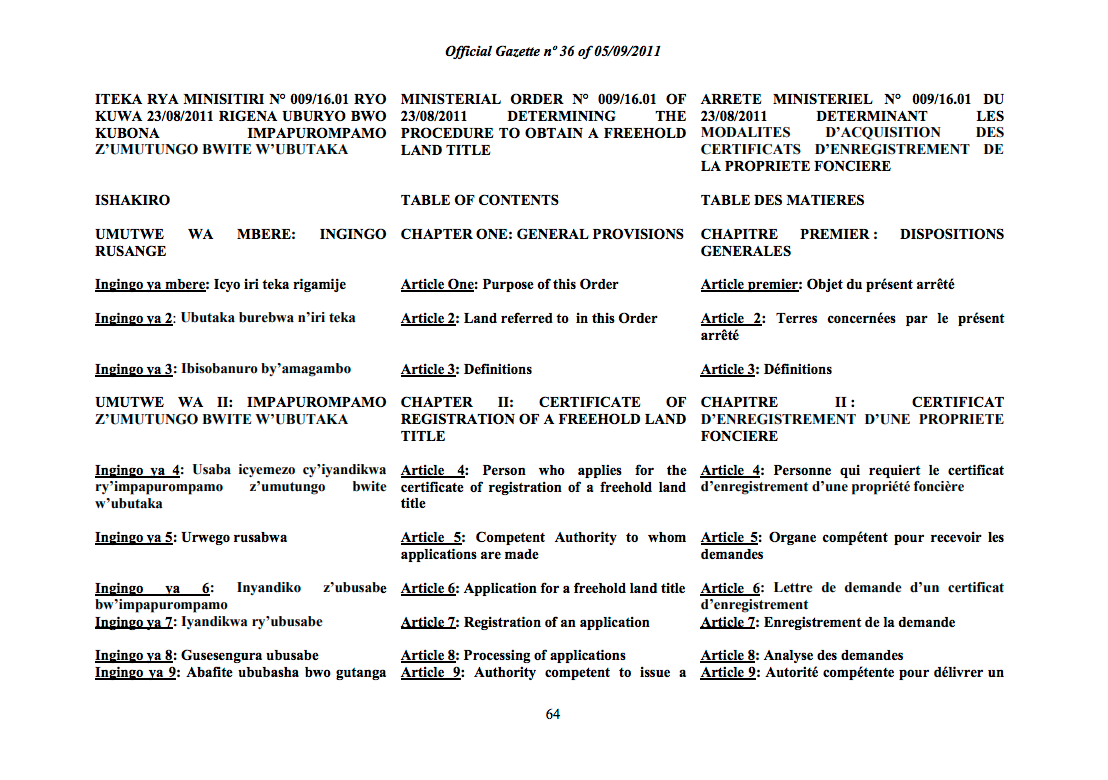The LAND Project is a five year program supported by the United States Agency for International Development (USAID). Its primary goal is strengthening the resilience of Rwandan citizens, communities and institutions and their ability to adapt to land-related economic, environmental and social changes.
Resilience is defined as “the ability to withstand or recover from difficult conditions.” It also comprises the ability of human and ecological systems to recover from shocks or difficult changes, and to transform to a better condition by responding flexibly and creatively to stress factors. In Rwanda, land tends to be one of the primary assets citizens rely on to buffer against difficult conditions and rapid change.
The project’s central objectives are twofold:
1.Increased capacity of local Rwandan institutions to generate high quality, evidence-based research on land-related issues that can be used by the Government, civil society organizations, and Rwandan citizens.
2. Increased understanding of land laws, policies, regulations, and legal judgments on land-related issues by GOR officials, local civil society organizations, research institutes and citizens.
Key outcomes of the project include:
- Holding annual National Land Research Agenda workshops to establish the research priorities of land sector stakeholders that the LAND Project will support. These workshops bring together multiple stakeholders from government, civil society and the research community;
- Supporting research on land-related issues through competitive awards to Rwandan research institutions, universities, and civil society organizations, and providing tailored capacity building assistance to improve research and advocacy capabilities;
- Offering training and other support to legal assistance providers to enhance their capacity to support women and vulnerable populations in understanding and realizing their land rights;
- Training local land authorities on the implementation of the land law and regulations.
- Carrying out research on critical land issues, including gendered land rights in practice, community rights to resources in and around protected areas, and expropriation.
- Managing a land-focused website to improve research, communications, and policy advocacy efforts that are focused on land, and to act as a vehicle for enhancing collaboration between actors working in the land sector;
- Providing organizational development support to civil society organizations supporting women’s land rights.
- Supporting innovative and coordinated communications approaches by civil society and government that enhance the knowledge of Rwandan citizens about research findings and their land rights.
Because the LAND Project is a five year endeavor, we are seeking an institution that has the interest, capacity, skills and resources to eventually take over hosting and maintenance of the website, ensuring it stays up-to-date and relevant to the land sector stakeholder community. If your organization is potentially interested in assuming management of this site, please contact us and tell us why you believe your institution would be an ideal candidate.
Members:
Resources
Displaying 51 - 55 of 149Enhancing Legal Empowerment and Customary Law in Rwanda: Report of a Pilot Project concerning Community-level Dispute Resolution and Women’s Land Rights
We present a report on the results of a 10-month pilot project conducted in North- Western Rwanda that aimed to explore fruitful ways to engage with customary law in order to empower rural communities and rural women in particular. The focus is on the effectiveness of land dispute resolution at the community level and the respect for women’s formally guaranteed land rights by the institutions involved.
The Abunzi Mediation in Rwanda: the Opportunity for Engaging with Traditional Institutions for Conflict Resolution
This Policy & Practice Brief analyses the role of traditional institutions for conflict resolution, paying special attention to their relevance in post-conflict societies. Using Rwanda’s abunzi mediation system as an example, the brief considers traditional African mechanisms for conflict resolution as unique, context-specific, and responsive to the justice needs of societies emerging from conflict.
Ministerial Order N° 009/16.1 of 23/8/2011 Determining the Procedure to Obtain Freehold Land Title.
Ministerial Order N° 009/16.1 of 23/8/2011 Determining the Procedure to Obtain Freehold Land Title. Published on the 5 September 2011.
Fonctionnement des comités de conciliateurs (ABUNZI) au Rwanda: Perceptions, Observation et Analyse
RCN Justice & Démocratie monitored the activities of the Mediation Committees (Komite y’Abunzi) in Rwanda for eighteen months from 2009 to 2011 and presents in this report its main findings and analysis. Such feed?back from the field enables the formulation of recommendations which aim to improve and reinforce the Abunzi’s performance.
Leave None to Claim the Land: A Malthusian Catastrophe in Rwanda
More than 200 years after its Örst publication, the Malthusian thesis is still much debated, albeit in a modiÖed form. Rather than predicting a global catastrophe, most neo-Malthusians stress the local character of the relationship between population pressure, natural resource scarcity, and conáict as well as its dependency on the socio-political and economic context. This softened version of Malthusíthesis has received little empirical support in cross-country studies.





